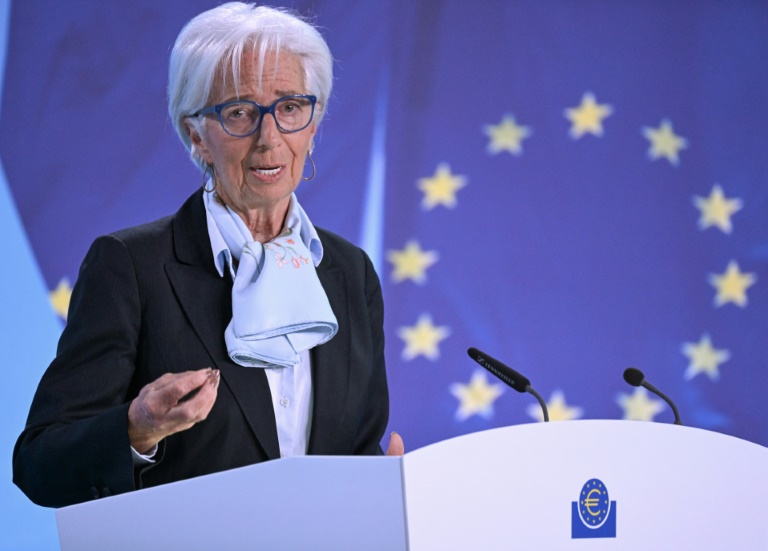Investors are watching closely to see if ECB President Christine Lagarde will offer any guidance on the pace of future interest rate cuts – Copyright AFP/File Kirill Kudryavtsev
Sam Reeves
The European Central Bank is expected to start cutting euro zone interest rates from record highs this week, but with inflation remaining elevated, the move is unlikely to trigger a rapid easing cycle.
Policy makers are due to cut euro zone borrowing costs by 0.25 percentage point on Thursday, lowering the key deposit rate to 3.75 percent from its current record high.
ECB officials have broadly warned of coming rate cuts and dismissed concerns about diverging from the U.S. Federal Reserve, where a strong economy has led them to push back when it might start cutting interest rates.
“The ECB's own communication over the past two months has made it almost impossible not to cut rates,” ING economist Carsten Brzeski said on Thursday.
The Frankfurt-based institution began an unprecedented cycle of rate hikes in mid-2022 as energy and food costs soared in the wake of Russia's invasion of Ukraine and pandemic-related supply chain woes.
It has kept interest rates on hold since October after 10 consecutive hikes, but a steady slowdown in inflation means a cut is looming, which would ease pressure on the struggling euro zone.
– Inflation defies expectations –
But while the ECB's 26-nation governing council is almost certain to cut borrowing costs on Thursday, recent better-than-expected data means it does not signal the start of a rapid rate-cutting cycle.
While consumer price inflation has slowed from a peak of more than 10% in late 2022 when Europe was hit by the energy shock, bringing inflation down to the ECB's 2% target is proving difficult.
Data released on Friday showed inflation in the 20 countries that use the euro rose at a faster pace than expected in May, to 2.6 percent year-on-year, up from a 2.4 percent increase in April.
Officials are particularly concerned about big price increases in the services sector and continued robust wage growth, as workers win big pay hikes to offset inflation.
The eurozone economy has also emerged from recession, growing better than expected in the first quarter, though growth remains slow compared with the strong growth in the U.S. economy.
Jack Allen Reynolds of Capital Economics said retreating inflation makes a further rate cut at the ECB's July meeting “unlikely.”
“Several policymakers have stressed that even if the central bank cuts rates (on Thursday), it will not be in a rush to cut rates again at its next meeting in July,” he said.
– Federal Reserve Bank concerns over deviation –
Investors will be watching to see whether European Central Bank President Christine Lagarde gives any guidance on the pace of future rate cuts in her post-meeting press conference.
The central bank is also due to publish its latest forecasts for growth and inflation on Thursday, which will influence interest rate setters' discussions about their next moves.
But Dirk Schumacher, an economist at Natixis Bank, said only “small changes” to forecasts were expected and “we're unlikely to get anything concrete” about what will happen after June.
In the United States, better-than-expected economic data has dampened expectations of when the Federal Reserve will start to cut borrowing costs when it next meets in mid-June, raising speculation the ECB may also hold its hands.
However, euro zone interest rate setters have stressed that they will set their own policy.
“The Fed's actions do not determine the ECB's rate cuts,” Bank of Finland Governor Olli Rehn, a member of the ECB's governing council, told AFP in an interview last month.
But there is a risk that if the ECB cuts rates faster than the United States, it could weaken the euro, making imports into the euro zone more expensive and spurring inflation.
Still, surprisingly strong recent data from the euro zone has led analysts to lower their forecasts for the number of rate cuts this year.
Berenberg Bank economist Holger Schmieding expects the ECB to cut rates just once per quarter this year, with deposit rates to be reduced to 3.25% by the end of 2024.

